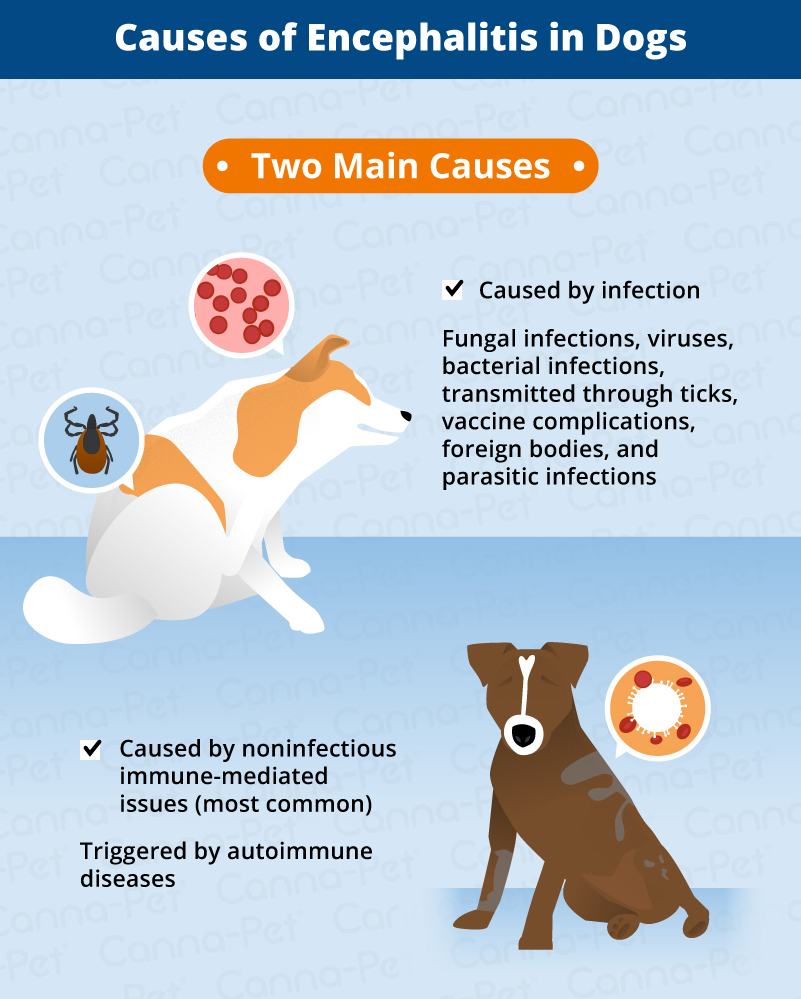In this peritoAnimal article, we will talk about a disease that, fortunately, is not very common, is encephalitis, inflammation and/or brain infection that, even in dogs under healing, can leave sequelae.the types of encephalitis differ depending on the factor that triggers them, we will also talk about the symptoms that will characterize encephalitis in dogs and the treatment that, as always, should be indicated by the veterinarian.
What is dog encephalitis? Encephalitis is an inflammation of the brain or clinical signs of encephalitis in dogs include:
However, when you notice any of these symptoms in your dog, you should go to the vet.
The most common cause of encephalitis is Carré’s disease, a life-threatening viral disease whose incidence is fortunately declining thanks to vaccination plans. Rabies, eradicated in many countries through vaccines, is another viral cause of encephalitis, as well as canine herpesvirus, which can cause encephalitis in newborn pups less than two weeks old.
Other, but less common, causes of encephalitis include fungal infections, i.e. caused by fungi, protozoa, rickettsias or ehrlichiosis; In addition to the brain, the spinal cord can also be damaged; there is also lead encephalitis, of the type that occurs in dogs that ingest lead-containing materials among its components, such as paint or plaster.These inadequate intakes are more likely in puppies. In these cases, symptoms such as vomiting, diarrhea or constipation are also observed.
This type of encephalitis in dogs is caused by bacteria that reach the brain through the circulatory system, although they can also spread directly from the nasal passage or an infected abscess in areas such as the head or neck.
This type of encephalitis in dogs occurs after the use of modified vaccines or modified viruses and is more likely to be activated when vaccines against Carré disease and canine parvovirus are given to puppies less than 6 to 8 weeks of age.
Meningitis is defined as inflammation of the membranes that line the brain and spinal cord, their origin usually caused by a bite in the head or neck area, which becomes infected, as well as bacterial infections that reach the brain from places such as the nose or ears can also cause meningitis.There is a type of meningitis, called aseptic or viral, that has an unknown origin and affects puppies of large breeds under two years of age.
This type of encephalitis in dogs is typical of small breeds, such as pug or yorkshire, is hereditary and affects young dogs under four years of age, can attack the entire brain or only specific areas, there is a rare form that is limited to optic nerves and causes sudden blindness.Unfortunately, this disease is progressive and has no treatment, only medications can be prescribed to slow your progress.
Diagnosis of canine encephalitis and meningitis is obtained after analysis of a sample of cerebrospinal fluid, which is removed by lumbar puncture, and the veterinarian should be tested to find out the underlying cause.Establish treatment, which will aim to eliminate the cause of encephalitis and control your symptoms.
Thus, corticosteroids can be used to reduce brain inflammation, if the dog has seizures, it will also be necessary to treat it with anticonvulsants, antibiotics can also be used to treat encephalitis in dogs, if the cause is a bacterial infection.
The additional problem with encephalitis in dogs is that even when they heal they can have sequelae, such as seizures and other neurological symptoms, symptoms that can be very variable as they will depend on the affected area and how recovered., you can observe tics, limp or walk without coordination.
Encephalitis in dogs, being an inflammation of the brain, is not contagious, however, being a symptom of diseases such as Carré’s disease, which is transmitted between contact dogs, depending on the triggering disease, it is necessary to take the necessary ones.Cautions That’s why it’s so important to go to the vet for a diagnosis as soon as possible.
This article is for informational purposes only, in Animal Expert.com.br we cannot prescribe veterinary treatments or make any type of diagnosis, we suggest taking your pet to the veterinarian in case of any type of condition or discomfort.
If you would like to read articles similar to, we recommend that you visit our Neurological Diseases section.

